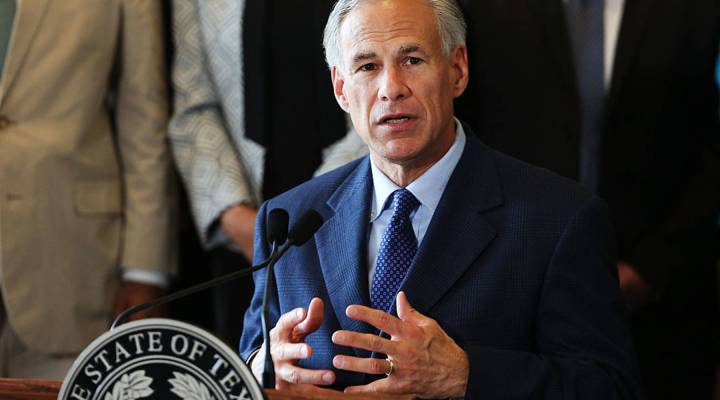
Austin, Texas, already faces costs for its ‘sanctuary city’ practices
Austin, Texas, already faces costs for its ‘sanctuary city’ practices

In the latest Marketplace-Edison Research Poll we asked people about a wall. The wall. Responses show that 57 percent of Americans think building a wall between the U.S. and Mexico would hurt the U.S. economy.
There are millions of people living illegally in the U.S., and more than 100,000 live in Austin, Texas. Austin law enforcement has pledged not to arrest and detain people for simply living there illegally. But that promise goes against a bill about to become law in Texas. It also goes against requests from Attorney General Jeff Sessions. And it’s costing Austin money and creating confusion – in the immigrant community as well as among law enforcement.
Several weeks ago, armed Immigration and Customs Enforcement agents entered the Travis County criminal court and began arresting people who could not prove they were in the U.S. legally, according to Travis County Judge Sarah Eckhardt. She called it a raid and said it undermined her work.
“This, I would submit, is not about sanctuary cities,” she said. “I would submit that this is straight-up political retribution.”
A U.S. judge found that the ICE arrests in the court were retaliation for the county refusing to cooperate, though ICE characterized the operation as routine. There’s been financial retaliation, too. Texas Gov. Greg Abbott cut $1.5 million from Travis County’s budget. Eckhardt said that will mean cuts to social services, a punishment from the state that doesn’t the fit the supposed crime.
“They are court programs, they are parks programs, they are emergency and disaster programs. Not a one of them has anything to do with immigration,” she said.
She estimates 4,600 people will lose services, and many of them are immigrants living illegally in the county.
Austin Mayor Steve Adler said when ICE raided the court, it also hit other locations. That’s ruined trust between the immigrant community and local law enforcement, and it has undercut Austin’s outreach efforts to immigrants.
“We find that the social service that we’re providing to parents and families are not having their clients show up in increasing numbers,” he said.
Mayor Adler went to Washington, D.C., to meet with Sessions. He wanted clarity on what “sanctuary city” means in the eyes of the federal government. Lots of other mayors do, too.
It’s not just government or law enforcement having trouble reaching immigrants due to all the confusion and fear. Justin Estep, director of the immigration law clinic at Catholic Charities of Central Texas, said their clients are skeptical of any outreach.
“Even when we try to put on informational clinics, one of the first questions we get is ‘How do we know that since y’all are advertising this, that ICE isn’t just going to park outside of the event and collect documents as people exit?'” he said.
ICE has deemed schools, hospitals and churches “sensitive locations.” That means agents aren’t supposed to arrest people there. But it’s not a hard and fast rule, and courthouses are not on the list.
In a statement to Marketplace, ICE said the agency “does arrest targets at courthouses but, only after investigating officers have exhausted other options.”
Eckhardt said if local police have to detain anyone who can’t prove they’re here legally, she’s going to have a space problem.
“We can manage a population of about 2,700 people in our Travis County jail,” she said. “We are right up at our population limit currently. If we are conscripted as an ICE detention facility, that means we are holding individuals for the federal government instead of holding individuals that we feel are a public safety threat.”
If Travis County doesn’t agree to hold those people, it could be breaking federal law. That could mean losing $52 million in federal grants for parks, highways and all kinds of things. She’s part of a team drafting a new county budget, in case that happens.
“What we’re looking at is either you cut services because you no longer have this grant revenue source, or you replace the grant revenue source either with borrowed one-time funds or with a tax increase,” she said.
It’s looking like Austin and Travis County will have to move some money around. This week, the Texas legislature passed a bill that makes “sanctuary city” practices illegal. It also calls for any sheriffs or police chiefs who don’t comply with ICE to be fired, like Travis County Sheriff Sally Hernandez.
Eckhardt said Travis County will continue to contest it. The fight over federal funding for sanctuary cities is tied up in court.
Take our economic anxiety quiz to see how you compare to the national average.
There’s a lot happening in the world. Through it all, Marketplace is here for you.
You rely on Marketplace to break down the world’s events and tell you how it affects you in a fact-based, approachable way. We rely on your financial support to keep making that possible.
Your donation today powers the independent journalism that you rely on. For just $5/month, you can help sustain Marketplace so we can keep reporting on the things that matter to you.












